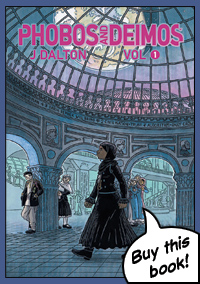Page 20
The challenge for today’s page was how to depict a refugee crisis that is at the same time: in a futuristic, until recently advanced, peaceful, and idyllic society; while also: newly dangerous and economically devastating, with most of the population either of African descent, South Asian, or both. Those are a lot of factors to juggle. I hope I got the point across.
I didn’t want to do the thing where I cast white people as my protagonists as a way to say “this is an issue that could theoretically affect anyone from any race,” while ignoring that in the time it will be read it mostly doesn’t affect white people. I also didn’t want to do the thing where I suggest that we can’t fix the racism problems we have now any time in the next 500 years, because we totally can.
Hmm. Writing is hard. I’ve got 400 more pages in which to work on that balance point.
Panel 2: "He was killed in his first battle with the Lowland soldiers."
Panel 3: The remaining family is devastated and weeping. Voice-over: "My cousin, who was really more like an older brother, was 'collateral damage' in a highway attack a month later."
Panel 4: Maida's family joins other refugees as they walk, drive, or bike down a rural Martian street in the spring thaw. Some of them have robots to carry their luggage. Voice-over: "Me, my younger brother, my mum, and my aunt stayed on in the Highlands for another year. But things were getting worse, not better. We had to move."
Panel 5: The refugees crowd onto a train platform, waiting for the train to arrive. Voice-over: "Downhill, everyone said. Downhill it's safer and you're still connected to the world."


Discussion ¬